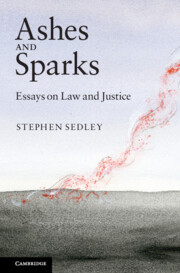Book contents
- Frontmatter
- Contents
- Preface
- Acknowledgements
- PART I History
- PART II Law
- 12 Justice miscarried
- 13 Breaking the law
- 14 Declining the brief
- 15 Big lawyers and little lawyers
- 16 Parliament, government, courts
- 17 Judges in lodgings
- 18 Mice peeping out of oakum
- 19 Justice in Chile
- 20 Never do anything for the first time
- 21 Rarely pure and never simple
- 22 Law and plumbing
- 23 The Laws of Documents
- PART III Justice
- Index
22 - Law and plumbing
Published online by Cambridge University Press: 05 June 2012
- Frontmatter
- Contents
- Preface
- Acknowledgements
- PART I History
- PART II Law
- 12 Justice miscarried
- 13 Breaking the law
- 14 Declining the brief
- 15 Big lawyers and little lawyers
- 16 Parliament, government, courts
- 17 Judges in lodgings
- 18 Mice peeping out of oakum
- 19 Justice in Chile
- 20 Never do anything for the first time
- 21 Rarely pure and never simple
- 22 Law and plumbing
- 23 The Laws of Documents
- PART III Justice
- Index
Summary
I am not sympathetic to the law and economics movement, but a significant number of legal academics are. Invited to make an opening address to the annual conference of the Society of Legal Scholars in 2006, I thought this might be a tactful way of approaching, if not exactly bridging, the divide, to which I return in Chapter 31.
Although I claim to be no more than a rude mechanical in the law, I have come over time to feel the need for a parallel system of pragmatic thinking, capable of affording both insights into the functioning of law and goals to which law itself should be aspiring. I want to use these brief opening remarks to introduce a new movement in legal thought: the law and plumbing movement.
What law and plumbing have to offer each other, and why, should be readily apparent. The judge approaches a case with much the same mixture of resignation and righteousness as a plumber responding to a callout. Each knows that he (if I refer to both as ‘he’, that will not surprise you) will not have been brought in until the efforts of those on the spot have left the place ankle-deep in water. Although, unlike the plumber, the judge cannot charge a king's ransom for his attendance (that is done now by the Court Service by means of filing fees), he shares with the plumber the sadistic pleasure of surveying the wreckage and groaning ‘Who installed this?’
- Type
- Chapter
- Information
- Ashes and SparksEssays On Law and Justice, pp. 225 - 227Publisher: Cambridge University PressPrint publication year: 2011



